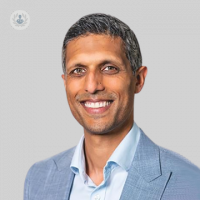All about the management of transient ischaemic attacks (TIA)
Written in association with:The management of a transient ischaemic attack (TIA) involves several critical steps to prevent the occurrence of a full-blown stroke. These steps include early expert review and diagnosis, timely investigations, immediate treatment and the identification and management of all vascular risk factors.
Here to discuss these steps in expert detail is leading consultant neurologist, stroke, and rehabilitation physician Dr Arvind Chandratheva, who practises at the Cleveland Clinic Rehabilitation Unit.

Why is early expert review and diagnosis important?
Early expert review and diagnosis are crucial in TIA management. Prompt consultation with a specialist allows for a comprehensive assessment of symptoms and risk factors. This rapid evaluation helps distinguish a TIA from other conditions that may mimic its symptoms, ensuring appropriate and timely intervention.
What investigations are conducted for TIA?
Early investigations are essential to identify the underlying cause of a TIA. This includes:
Review of vessels
Investigations often involve imaging studies such as Doppler ultrasound or magnetic resonance angiography (MRA) to assess the blood vessels supplying the brain. Identifying any blockages or narrowing in the arteries is critical for determining the risk of future strokes.
Brain imaging
Brain imaging, typically through magnetic resonance imaging (MRI) or computed tomography (CT) scans, helps identify any brain tissue damage and rule out other possible causes of the symptoms. MRI is particularly useful for detecting small, clinically silent infarcts that might suggest a higher stroke risk.
Cardiac monitoring
Cardiac monitoring, including electrocardiograms (ECG) and echocardiograms, is conducted to detect heart-related issues that could contribute to a TIA, such as atrial fibrillation or other cardiac abnormalities. Continuous cardiac monitoring may also be necessary to detect intermittent arrhythmias that might not be apparent during a single ECG.
What immediate treatments are given for TIA?
Immediate treatment following a TIA aims to reduce the risk of a subsequent stroke. The treatment plan may include:
Antiplatelet medications
Drugs like aspirin or clopidogrel are often prescribed to prevent blood clots from forming.
Anticoagulants
For patients with atrial fibrillation or other specific conditions, anticoagulants such as warfarin or direct oral anticoagulants (DOACs) may be recommended.
Blood pressure management
Controlling high blood pressure is vital, as it is a significant risk factor for strokes. Medications and lifestyle changes may be advised to maintain optimal blood pressure levels.
Cholesterol management
Statins or other lipid-lowering agents may be prescribed to manage high cholesterol levels, another key risk factor for strokes.
How are vascular risk factors identified and managed?
Appropriate identification and management of all vascular risk factors are essential for preventing future strokes. This involves a thorough review of the patient’s medical history and lifestyle, including:
Hypertension
Monitoring and controlling blood pressure through medications, dietary changes and regular exercise.
Diabetes
Managing blood sugar levels through medication, diet and exercise to prevent vascular complications.
Smoking
Advising smoking cessation to reduce the risk of stroke and other vascular diseases.
Diet and exercise
Encouraging a healthy diet and regular physical activity to maintain overall cardiovascular health.
How can patients reduce their risk of a future stroke?
Patients who have experienced a TIA should engage in regular follow-up appointments with their healthcare provider to monitor their condition and adjust treatment as necessary. Adopting a healthy lifestyle, adhering to prescribed medications and managing risk factors effectively are key strategies in reducing the risk of a future stroke.
Understanding the importance of early expert review, timely investigations, immediate treatment and the management of vascular risk factors can significantly improve outcomes for patients who have experienced a TIA. Through comprehensive and proactive care, the risk of subsequent strokes can be markedly reduced, ensuring better long-term health and quality of life.
Require expert assistance regarding TIA management? Arrange a consultation with Dr Chandratheva via his Top Doctors profile.


